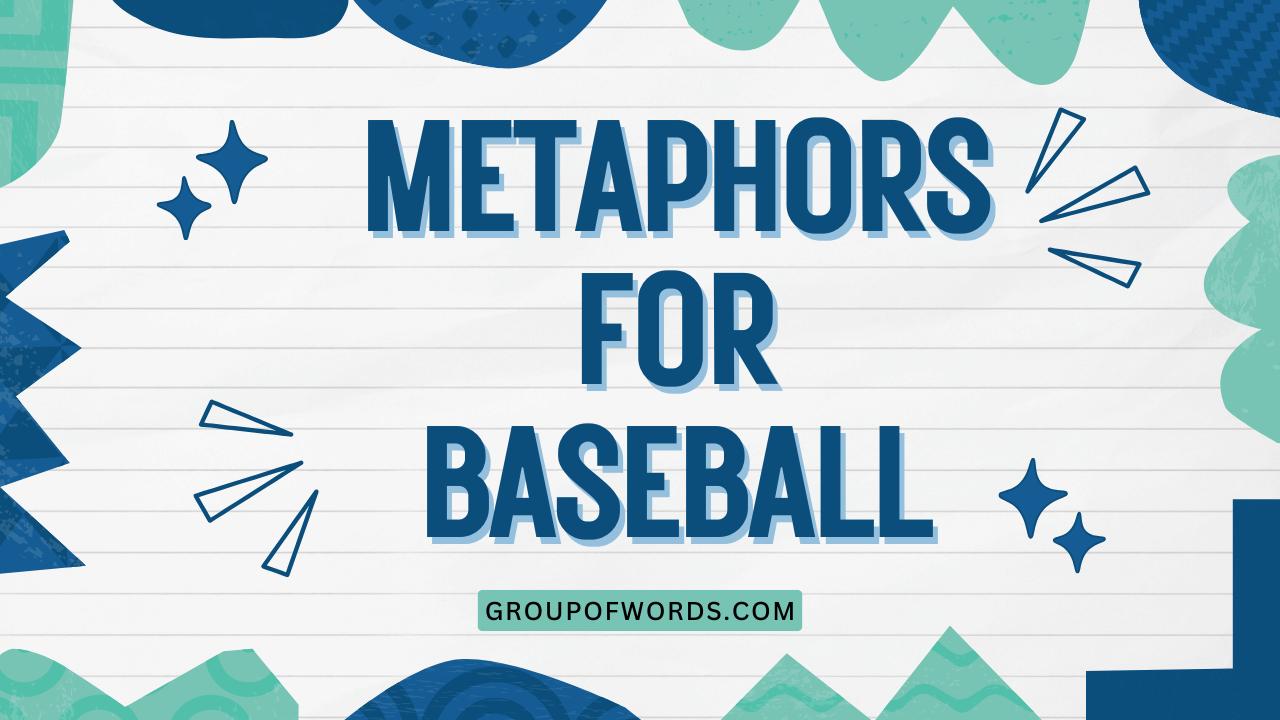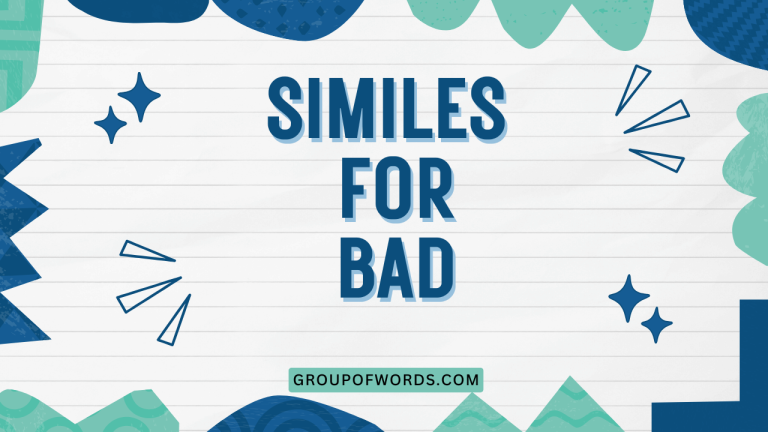Swinging for the Fences: Mastering Baseball Metaphors
Baseball, often called America’s pastime, is a sport rich in history, strategy, and colorful language. Many of its terms and phrases have transcended the baseball diamond and become deeply embedded in everyday English.
Understanding baseball metaphors is essential for anyone looking to improve their comprehension of American English, appreciate the nuances of sports commentary, or simply enjoy the richness of the language. This article will delve into the world of baseball metaphors, exploring their meanings, origins, and usage, providing you with the knowledge to confidently “step up to the plate” and use them yourself.
Whether you’re a beginner or an advanced learner, this guide will help you navigate the bases and hit a home run with your language skills.
Table of Contents
- Introduction
- What is a Baseball Metaphor?
- Structural Breakdown of Baseball Metaphors
- Categories of Baseball Metaphors
- Examples of Baseball Metaphors
- Usage Rules for Baseball Metaphors
- Common Mistakes with Baseball Metaphors
- Practice Exercises
- Advanced Topics in Baseball Metaphors
- Frequently Asked Questions
- Conclusion
What is a Baseball Metaphor?
A baseball metaphor is a figure of speech that uses terminology and concepts from the sport of baseball to describe situations, actions, or ideas in a non-baseball context. These metaphors draw parallels between the strategic and competitive nature of baseball and various aspects of life, business, and relationships.
They add color, imagery, and a sense of familiarity to everyday conversations and writing. Understanding these metaphors requires not only knowledge of the English language but also a basic understanding of the game of baseball itself.
Baseball metaphors function primarily as analogies, comparing the attributes of a baseball term to a similar attribute in a different context. For example, “striking out” in baseball means failing to hit the ball and being dismissed from the at-bat; metaphorically, it means failing at an attempt or endeavor. These metaphors can be used in various contexts, from formal business presentations to casual conversations with friends. They often convey a sense of action, competition, and the potential for both success and failure.
Structural Breakdown of Baseball Metaphors
Baseball metaphors typically involve a source domain (baseball) and a target domain (the non-baseball context). The source domain provides the language and imagery, while the target domain receives the metaphorical meaning. For example, in the metaphor “He’s batting a thousand,” the source domain is baseball, and the target domain is someone’s success rate. The structure is: [Baseball Term] = [Equivalent Action/Situation in Another Context].
Many baseball metaphors follow a verb-noun structure that is easily adaptable. For instance, “touch base” (verb + noun) means to make contact or communicate, and “cover all the bases” (verb + noun + noun) means to prepare for all possibilities.
The meaning is derived from understanding what these actions represent in a baseball game and transferring that understanding to the new context.
The effectiveness of a baseball metaphor relies on its clarity and relevance to the audience. A well-chosen metaphor can make a complex idea more relatable and memorable.
However, an obscure or poorly understood metaphor can lead to confusion. Consider the audience and the context when using baseball metaphors to ensure they resonate effectively.
Categories of Baseball Metaphors
Baseball metaphors can be broadly categorized based on the specific aspect of the game they represent. Understanding these categories can help you identify and interpret metaphors more easily.
Metaphors Related to Hitting
These metaphors involve actions related to batting, such as hitting, swinging, and missing. They often describe attempts, successes, and failures.
Metaphors Related to Pitching
Pitching metaphors involve terms related to throwing the ball, such as pitching, throwing curves, and striking out. They usually describe strategies, challenges, and outcomes.
Metaphors Related to Fielding
Fielding metaphors involve actions related to catching and defending, such as covering bases, tagging out, and making errors. They often refer to preparedness, mistakes, and responsibilities.
Metaphors Related to Base Running
Base running metaphors involve terms related to running the bases, such as stealing bases, scoring runs, and getting on base. They typically describe progress, opportunities, and achievements.
Metaphors Related to the Game Overall
These metaphors encompass broader aspects of the game, such as the score, the inning, and the overall strategy. They often describe the state of affairs, time constraints, and long-term planning.
Examples of Baseball Metaphors
This section provides extensive examples of baseball metaphors, organized by category, to illustrate their usage and meaning.
Examples of Hitting Metaphors
The following table provides examples of hitting metaphors, their literal meanings in baseball, and their metaphorical meanings in everyday contexts. Use these examples to improve your understanding of how these metaphors are used.
| Baseball Metaphor | Literal Meaning (Baseball) | Metaphorical Meaning (Everyday Context) | Example Sentence |
|---|---|---|---|
| Batting a thousand | Having a perfect batting average (1.000) | Being extremely successful or having a perfect record | “This quarter, the sales team is batting a thousand; every deal has closed.” |
| Swing and a miss | Attempting to hit the ball and failing | Making an attempt that fails completely | “He tried to impress her with a joke, but it was a swing and a miss.” |
| Knocking it out of the park | Hitting a home run | Achieving exceptional success | “Her presentation knocked it out of the park; the clients were very impressed.” |
| Stepping up to the plate | Taking one’s turn to bat | Taking on a challenge or responsibility | “When the project needed a leader, she stepped up to the plate.” |
| Getting a hit | Successfully hitting the ball | Achieving a small success or making a positive impact | “His blog post got a hit with readers, generating a lot of traffic.” |
| Taking a swing at it | Attempting to hit the ball | Making an effort or trying something | “I’m not sure I can fix the computer, but I’ll take a swing at it.” |
| A tough act to follow | The previous batter performed exceptionally well | Setting a high standard that is difficult to surpass | “After his groundbreaking research, he’s a tough act to follow.” |
| Right off the bat | Immediately after the ball is hit | Immediately or from the beginning | “Right off the bat, I knew this was going to be a successful project.” |
| On deck | The next batter to bat | Next in line or about to happen | “We finished the marketing plan, and the budget review is now on deck.” |
| Full count | The batter has three balls and two strikes | A situation at its most tense or critical stage | “Negotiations are at a full count; the next move is crucial.” |
| Foul ball | A ball hit outside the fair territory | A failed attempt or something that doesn’t count | “His argument was a foul ball; it didn’t address the main issue.” |
| Bunt | A soft hit intended to advance a runner | A small, strategic action to achieve a larger goal | “He used a bunt strategy to get the meeting started on a positive note.” |
| Cleanup hitter | The batter who hits fourth in the lineup, typically a strong hitter | The person who is relied upon to resolve a difficult situation | “She’s our cleanup hitter; she always knows how to close the deal.” |
| Designated hitter | A player who bats in place of another player, usually the pitcher | Someone assigned to perform a specific task | “He’s the designated hitter for this project; his only job is to handle the marketing.” |
| Hit it where they ain’t | Hit the ball where the fielders aren’t positioned | Find a niche or opportunity where there is less competition | “To succeed in this market, you have to hit it where they ain’t; find an underserved customer base.” |
| See how it plays out | Watch and observe how a play develops | Wait and see what happens | “Let’s see how it plays out before making any big decisions.” |
| Take a called strike | Let the pitch go by without swinging, and the umpire calls it a strike | Accept a setback or missed opportunity without protest | “He had to take a called strike when the deal fell through, but he’s ready for the next opportunity.” |
| Grand slam | A home run with the bases loaded | A major success that achieves multiple goals at once | “The new product launch was a grand slam; it exceeded all expectations.” |
| Go to bat for someone | To bat in place of or in support of someone | To defend or support someone | “I will go to bat for her; she deserves this promotion.” |
| Hit for the cycle | To hit a single, double, triple, and home run in the same game | To achieve a diverse set of accomplishments | “He hit for the cycle this year, excelling in sales, marketing, and customer service.” |
Examples of Pitching Metaphors
The following table provides examples of pitching metaphors, their literal meanings in baseball, and their metaphorical meanings in everyday contexts.
| Baseball Metaphor | Literal Meaning (Baseball) | Metaphorical Meaning (Everyday Context) | Example Sentence |
|---|---|---|---|
| Throw someone a curveball | Pitch a ball that curves unexpectedly | Surprise someone with an unexpected challenge or problem | “The new regulations threw us a curveball; we had to adjust our strategy.” |
| Pitch a shutout | Prevent the opposing team from scoring any runs | Completely defeat or outperform someone | “Our team pitched a shutout in the debate; the opposition had no response.” |
| In the ballpark | Within the area of the baseball field | Close to the correct amount or estimate | “The initial estimate was in the ballpark, but we need a more precise figure.” |
| Throws me for a loop | A pitch that confuses the batter | Something that confuses or surprises someone | “His sudden resignation really threw me for a loop.” |
| Hardball | Playing the game aggressively | Using aggressive or uncompromising tactics | “During the negotiations, they played hardball and refused to compromise.” |
| Screwing around | Not taking the game seriously | Wasting time or not being productive | “Stop screwing around and get back to work.” |
| Changeup | A pitch thrown with the same arm motion as a fastball but with reduced speed | A change in strategy or approach | “We need to throw them a changeup to keep them from predicting our next move.” |
| Wild pitch | A pitch that is thrown so erratically that the catcher cannot catch it | An idea or action that is completely off target or ineffective | “His suggestion was a wild pitch; it had nothing to do with the problem.” |
| Bottom of the ninth | The final part of the game where the home team has their last chance to score | The last opportunity to achieve something | “We’re in the bottom of the ninth for this project; we need to push hard to finish on time.” |
| Fastball | A pitch thrown at high speed | A direct and straightforward approach | “Let’s give them the fastball; no need to beat around the bush.” |
| Breaking ball | A pitch that curves or changes direction sharply | A sudden change or unexpected event | “The market took a breaking ball, and we had to adjust our investments.” |
| Get two strikes against you | To have two strikes in an at-bat, leaving little room for error | To be in a difficult or precarious situation | “With the budget cuts, we already have two strikes against us.” |
| Control the tempo | The pitcher dictates the pace of the game | To manage or influence the rhythm of a situation | “She tried to control the tempo of the meeting to keep it on track.” |
| Throwing heat | Pitching with high velocity | Presenting intense or forceful arguments | “The lawyer was throwing heat during the trial, aggressively questioning the witness.” |
| Start off on the wrong foot | To begin a game poorly | To begin something badly or negatively | “He started off on the wrong foot by arriving late to the interview.” |
| Perfect game | A game in which the pitcher does not allow a single baserunner | A flawless performance or outcome | “The company delivered a perfect game this quarter, exceeding all expectations.” |
| Come out swinging | To start the game with an aggressive batting approach | To start a task or challenge with enthusiasm and determination | “We’re going to come out swinging and show them what we’re capable of.” |
| Mound presence | The pitcher’s confidence and command on the pitcher’s mound | Confidence and authority in a leadership position | “The CEO has a strong mound presence, inspiring confidence in the team.” |
| Deliver | The act of pitching the ball | To produce a promised result or outcome | “He promised to deliver the report by Friday, and he always keeps his word.” |
| Set the stage | The pitcher prepares the situation for the next play | To prepare the circumstances for something to happen | “The opening speaker set the stage for a productive conference.” |
Examples of Fielding Metaphors
The following table provides examples of fielding metaphors, their literal meanings in baseball, and their metaphorical meanings in everyday contexts.
| Baseball Metaphor | Literal Meaning (Baseball) | Metaphorical Meaning (Everyday Context) | Example Sentence |
|---|---|---|---|
| Cover all the bases | Ensure that all bases are properly defended | Prepare for all possible outcomes or contingencies | “We need to cover all the bases before launching the new product.” |
| Drop the ball | Fail to catch a ball that should have been caught | Make a mistake or fail to fulfill a responsibility | “I dropped the ball by forgetting to send the email.” |
| Fumble | To fail to catch the ball cleanly | To handle something clumsily or ineffectively | “He fumbled the presentation, losing his train of thought.” |
| Tag up | A runner waits on the base and advances when the fielder catches the ball | To wait for the right moment to act | “We need to tag up and wait for the market conditions to improve before investing.” |
| Play ball | Start the game | Get started or begin a task | “Alright, everyone, let’s play ball and get this project done.” |
| Take one for the team | Allow oneself to be hit by a pitch to advance a runner | Make a sacrifice for the benefit of the group | “He took one for the team by working late to meet the deadline.” |
| Caught off base | A runner is far from the base and vulnerable to being tagged out | Unprepared or in a vulnerable position | “We were caught off base by the sudden change in the market.” |
| Safe | The runner reaches the base without being tagged | Secure, protected, or free from danger | “His job is safe despite the company’s restructuring.” |
| Ground rule double | A ball that bounces into the stands, automatically awarding the batter second base | An unexpected event that results in a positive outcome | “The government’s policy change was a ground rule double for our industry.” |
| Error | A mistake made by a fielder that allows a runner to advance | A mistake or fault | “There was an error in the report, so we need to revise it.” |
| Force out | A runner is forced to advance because the batter becomes a runner | To be compelled to do something due to circumstances | “We were forced out of our original plan due to budget constraints.” |
| Double play | Two outs are recorded in a single play | Achieving two objectives simultaneously | “By restructuring the department, we achieved a double play: reducing costs and improving efficiency.” |
| Pickoff | A quick throw to a base to tag out a runner | To eliminate a threat or problem quickly | “The security team picked off the hacker before they could access the system.” |
| Hot corner | Third base, where the ball is often hit with great force | A position of high pressure or responsibility | “He’s been assigned to the hot corner, managing the company’s most critical projects.” |
| Get a good jump | To anticipate the pitch and get a quick start | To be proactive and start early | “We need to get a good jump on the competition by launching our product early.” |
| Infield fly rule | A rule that allows the batter to be automatically out in certain situations | A situation where the outcome is predetermined | “The decision was made under the infield fly rule; there was no way to change it.” |
| Backstop | The fence or wall behind home plate that stops stray pitches | A last resort or safety net | “The emergency fund serves as a backstop in case of unexpected expenses.” |
| Clean up | To remove runners from the bases | To resolve a problem or fix a mess | “He was brought in to clean up the company’s financial issues.” |
| Get the out | To record an out, removing a player from the game | To eliminate an obstacle or solve a problem | “We need to get the out on this regulatory issue before we can proceed.” |
| Line drive | A ball hit hard and directly into the field | A direct and effective approach | “The team’s new marketing strategy is a line drive to increase sales.” |
Examples of Base Running Metaphors
The following table provides examples of base running metaphors, their literal meanings in baseball, and their metaphorical meanings in everyday contexts.
| Baseball Metaphor | Literal Meaning (Baseball) | Metaphorical Meaning (Everyday Context) | Example Sentence |
|---|---|---|---|
| Touch base | Make contact with a base while running | Make contact or communicate with someone | “Let’s touch base next week to discuss the project progress.” |
| First base | The first base a runner must reach | The initial stage or starting point | “We’re only at first base with this project; there’s still a lot of work to do.” |
| Second base | The second base a runner must reach | Making progress or advancing to the next stage | “We’ve reached second base with our funding; we’re halfway to our goal.” |
| Third base | The third base a runner must reach | Near the completion of a task or goal | “We’re on third base with the negotiations; we’re almost ready to close the deal.” |
| Home run | Successfully reaching home plate and scoring a run | Achieving a major success or goal | “Landing the Johnson account was a home run for our company.” |
| Stealing bases | Advancing to the next base without the ball being hit | Taking calculated risks to gain an advantage | “He’s known for stealing bases in business, taking risks to get ahead.” |
| Get on base | Successfully reach at least first base | Achieve a small success or gain an initial advantage | “The first step is to get on base; then we can start building from there.” |
| Run interference | To block or protect a runner | To protect or support someone by removing obstacles | “She ran interference for her colleague, shielding him from criticism.” |
| Slide into home | To slide into home plate to avoid being tagged out | To complete something just in time or narrowly avoid failure | “We slid into home with the project, finishing just before the deadline.” |
| Walk | Advancing to first base after four balls are thrown | An easy or effortless achievement | “He walked into the job; he didn’t even have to interview.” |
| Force play | A play where a runner is forced to advance | A situation where someone is obligated to act | “It was a force play; he had no choice but to accept the offer.” |
| Score | To earn a run by reaching home plate | To achieve a success or gain an advantage | “We scored a major victory by winning the contract.” |
| Rundown | A situation where a runner is caught between bases | A period of confusion or uncertainty | “We were in a rundown trying to figure out the new regulations.” |
| Home stretch | The final part of the race to home plate | The final stage of a project or task | “We’re in the home stretch now; we just need to put the finishing touches on the report.” |
| Advance the runner | To move a runner closer to home plate | To make progress or move forward | “We need to advance the runner by implementing these new strategies.” |
| Base hit | A hit that allows the batter to reach base safely | A small success that contributes to a larger goal | “Each sale is a base hit that gets us closer to our target.” |
| Clean up the bases | To clear all runners from the bases with a hit | To resolve all outstanding issues or problems | “We need to clean up the bases before we can move forward with the next phase.” |
| Extra innings | Additional innings played when the game is tied | Extended effort or time required to achieve a goal | “We had to go into extra innings to finalize the deal.” |
| Bottom of the order | The last batters in the lineup, typically weaker hitters | The least important or influential members of a group | “The proposal was dismissed because it came from the bottom of the order.” |
| Lead off | The first batter in the lineup | To start or initiate something | “She will lead off the presentation with an overview of the project.” |
Usage Rules for Baseball Metaphors
While baseball metaphors can add color and impact to your communication, it’s important to use them correctly and appropriately. Here are some guidelines to follow:
- Know Your Audience: Ensure that your audience is familiar with baseball. Using baseball metaphors with people who don’t understand the game can lead to confusion.
- Consider the Context: Baseball metaphors are most appropriate in informal or semi-formal settings. Avoid using them in highly formal or technical contexts.
- Avoid Overuse: Using too many baseball metaphors can make your language sound cliché and repetitive. Use them sparingly and strategically.
- Ensure Clarity: Make sure the metaphorical meaning is clear from the context. If there is any ambiguity, provide additional explanation.
- Be Aware of Regional Differences: While baseball is popular in the United States, its popularity varies in other countries. Consider the cultural background of your audience.
Common Mistakes with Baseball Metaphors
Even experienced English speakers sometimes make mistakes when using baseball metaphors. Here are some common errors to watch out for:
| Incorrect Usage | Correct Usage | Explanation |
|---|---|---|
| “He really hit a home run on that project, dropping the ball at the same time.” | “He really hit a home run on that project, but he dropped the ball on the follow-up.” | Contradictory metaphors in the same sentence can be confusing. |
| “We need to touch base with first base.” | “We need to touch base with the team.” | The phrase “touch base” already implies contact; adding “with first base” is redundant. |
| “She’s batting a thousand, so she’s definitely going to drop the ball.” | “She’s batting a thousand, so she’s likely to succeed.” | “Batting a thousand” means being extremely successful, not likely to fail. |
| “They threw me a curveball by telling me to cover all the bases.” | “They threw me a curveball by changing the deadline.” | “Covering all the bases” is a separate metaphor and doesn’t fit with the surprise element of “curveball.” |
| “He’s in the bottom of the ninth to start the project.” | “He’s leading off to start the project.” | “Bottom of the ninth” is the end of a game; “leading off” is the beginning. |
| “Let’s play ball, but don’t step up to the plate.” | “Let’s play ball, and everyone needs to step up to the plate.” | “Stepping up to the plate” means taking responsibility, which aligns with “play ball.” |
| “We have two strikes, so we’re batting a thousand.” | “We have two strikes, so we need to be careful.” | Having two strikes is a precarious situation, the opposite of “batting a thousand.” |
| “She slid into first base for a home run.” | “She slid into home for the win.” | You slide into home, not first base, to score. |
| “Let’s get a wild pitch on the ball.” | “Let’s take a swing at the ball.” | A wild pitch is something thrown *at* the batter. |
| “Hit a foul ball out of the ground.” | “Knock it out of the park.” | Hitting a foul ball is a failed attempt, not a success. |
Practice Exercises
Test your understanding of baseball metaphors with these practice exercises. Choose the correct metaphorical meaning for each sentence.
-
What does it mean when someone says, “We need to cover all the bases on this project”?
- We need to visit all the baseball stadiums.
- We need to prepare for all possible outcomes.
- We need to play baseball during the project.
Answer: b. We need to prepare for all possible outcomes.
-
If someone says, “He really dropped the ball on that presentation,” what does it mean?
- He forgot to bring the presentation materials.
- He made a mistake or failed to fulfill his responsibility.
- He literally dropped a ball during the presentation.
Answer: b. He made a mistake or failed to fulfill his responsibility.
-
What does it mean to “touch base” with someone?
- To physically touch a base.
- To make contact or communicate with them.
- To play baseball with them.
Answer: b. To make contact or communicate with them.
-
If your boss says, “Let’s play ball,” what does he mean?
- Let’s go play a game of baseball.
- Let’s start working on the project.
- Let’s discuss baseball strategies.
Answer: b. Let’s start working on the project.
-
What does it mean to “throw someone a curveball”?
- To literally throw a ball that curves.
- To surprise someone with an unexpected challenge.
- To pitch a baseball game.
Answer: b. To surprise someone with an unexpected challenge.
-
If someone is “batting a thousand,” what does that mean?
- They are literally hitting the ball perfectly every time.
- They are extremely successful.
- They are playing a baseball game.
Answer: b. They are extremely successful.
-
What does it mean to “step up to the plate”?
- To literally step up to the batter’s plate.
- To take on a challenge or responsibility.
- To watch a baseball game.
Answer: b. To take on a challenge or responsibility.
-
If someone says, “We’re in the home stretch,” what does that mean?
- We’re running towards home base.
- We’re in the final stage of a project.
- We’re playing a baseball game at home.
Answer: b. We’re in the final stage of a project.
-
What does it mean to “knock it out of the park”?
- To literally hit a home run.
- To achieve exceptional success.
- To break a baseball bat.
Answer: b. To achieve exceptional success.
-
If someone is “caught off base,” what does that mean?
- They are literally caught between bases.
- They are unprepared or in a vulnerable position.
- They are playing baseball without shoes.
Answer: b. They are unprepared or in a vulnerable position.
Advanced Topics in Baseball Metaphors
For advanced learners, exploring the historical and cultural context of baseball metaphors can provide a deeper understanding of their meaning and usage. Researching the origins of specific phrases and their evolution over time can reveal interesting insights into American culture and language.
Another advanced topic is the creative use of baseball metaphors in literature and rhetoric. Authors and speakers often adapt and combine metaphors to create unique and impactful expressions.
Analyzing these creative uses can enhance your ability to use metaphors effectively in your own writing and speaking.
Consider how baseball metaphors vary across different dialects and regions. Some metaphors may be more common in certain areas than others
.
Understanding these regional differences can help you tailor your language to specific audiences and avoid misunderstandings.
Frequently Asked Questions
Why are baseball metaphors so common in American English?
Baseball has been a central part of American culture for over a century, providing a shared experience and vocabulary that many people understand. The game’s strategic and competitive nature lends itself well to metaphorical applications in business, politics, and everyday life.
Are baseball metaphors used in other languages?
While some languages may have equivalent metaphors based on their own national sports, baseball metaphors are largely specific to English, particularly American English. Translating them directly into another language may not convey the intended meaning.
How can I improve my understanding of baseball metaphors?
The best way to improve your understanding is to familiarize yourself with the game of baseball. Watch games, read articles about baseball, and pay attention to how commentators and writers use baseball terminology.
Practice using metaphors in your own writing and speaking.
Is it appropriate to use baseball metaphors in formal writing?
In general, baseball metaphors are more appropriate in informal or semi-formal writing. In highly formal or technical writing, it’s best to use more precise and literal language.
What are some alternatives to baseball metaphors?
If you’re concerned that your audience may not understand baseball metaphors, you can use other types of metaphors or analogies that are more universally understood. For example, you could use metaphors from business, nature, or everyday activities.
How do I know if I’m using a baseball metaphor correctly?
Double-check the meaning of the metaphor and ensure that it accurately reflects the situation you’re describing. Consider your audience and whether they are likely to understand the metaphor.
If in doubt, it’s better to use a more straightforward expression.
Are there any baseball metaphors that should be avoided?
Avoid using obscure or outdated baseball metaphors that are not commonly understood. Also, be careful not to use metaphors that could be offensive or insensitive.
Can I create my own baseball metaphors?
While it’s possible to create your own metaphors, it’s generally best to stick to established phrases that are widely recognized and understood. Creating new metaphors can be risky, as they may not be clear or effective.
How has the use of baseball metaphors changed over time?
Some baseball metaphors have remained popular for decades, while others have faded into obscurity. The changing nature of the game and the evolution of language influence the use of baseball metaphors.
Staying up-to-date with current trends can help you use metaphors effectively.
Where can I find more examples of baseball metaphors?
You can find more examples of baseball metaphors in books, articles, and websites about baseball, as well as in general resources on English idioms and metaphors. Pay attention to how they are used in context to get a better understanding of their meaning and usage.
Conclusion
Baseball metaphors provide a rich and colorful way to express ideas and concepts in English. By understanding the origins, meanings, and usage rules of these metaphors, you can enhance your communication skills and gain a deeper appreciation for American culture.
Whether you’re “stepping up to the plate” in a business meeting or “touching base” with a friend, baseball metaphors can help you connect with your audience and convey your message effectively. So, go ahead and “swing for the fences” with your newfound knowledge of baseball metaphors!






